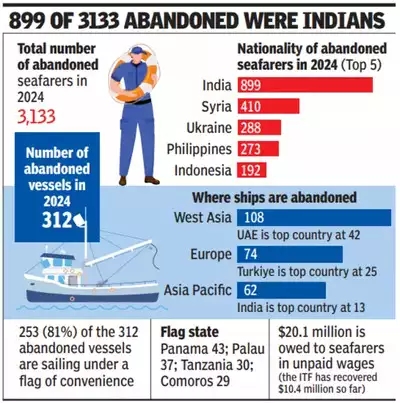
Source: TOI
Humanitarian Crisis
- Seafarers often go months without pay, with some left without basic provisions, fuel, or medical aid.
- They suffer from mental and physical distress, being stranded in foreign ports or international waters.
- Many abandoned ships are in conflict zones or unsafe waters, making rescue operations difficult.
Legal and Financial Complications
- Many cases involve obscure ownership structures that make it hard to trace responsibility.
- Employers evade financial liabilities by registering vessels under flags of convenience (FOC), which have weak enforcement mechanisms.
- Seafarers are often trapped by legal loopholes, unable to leave vessels due to immigration rule
India's Maritime Workforce at Risk
- With over 200,000 Indian seafarers in the global shipping industry, the rising abandonment cases put thousands more at risk.
- Lack of insurance enforcement and weak protection mechanisms allow unscrupulous shipowners to exploit Indian workers disproportionately.
Countermeasures at the International Level
The Role of Global Bodies & The Need for Reforms
Tackling the abandonment crisis requires coordinated action from global institutions, governments, and the shipping industry. While the IMO and ILO have taken steps to raise awareness and improve reporting mechanisms, more must be done.
Stronger Enforcement of the MLC: FoC countries must impose penalties on shipowners who fail to meet their obligations. Seafarers should have guaranteed legal support and financial security.
Government Intervention: Labor-supplying nations must educate and support seafarers, ensuring they understand their rights. Establishing repatriation funds will prevent workers from being left stranded.
Industry Accountability: Shipping companies must adopt best practices, prioritizing fair wages, safe working conditions, and transparent contracts. Industry leaders should push for stronger regulations to ensure seafarer welfare.
Strengthening IMO and ITF Regulations
The International Maritime Organization (IMO) must strictly enforce the Maritime Labour Convention (MLC), 2006, ensuring shipowners fulfill their obligations.
The International Transport Workers’ Federation (ITF) should create a global fund to support abandoned seafarers, financed by a mandatory contribution from shipowners.
Blacklisting and Sanctioning Defaulting Shipowners
- Governments and maritime authorities must blacklist shipowners with a history of abandonment.
- Defaulting shipowners should face strict financial penalties and seizure of their assets to compensate seafarers.
- Strengthen the Port State Control (PSC) mechanism to prevent ships owned by habitual offenders from docking at major ports.
Eliminating Flags of Convenience (FOC)
- Many abandoned vessels are registered under flags of convenience (e.g., Panama, Liberia, Marshall Islands) to avoid regulatory scrutiny.
- IMO should create a common international register that holds owners accountable regardless of flag registration.
Mandatory Seafarer Wage Insurance
- Governments should mandate compulsory wage insurance, ensuring salaries are deposited in escrow accounts so that even if a company goes bankrupt, sailors are paid.
Establishing Rapid Response Maritime Task Forces
- International cooperation is needed to form task forces that respond quickly to abandoned seafarers.
- These teams, operated jointly by ITF and IMO, should have access to emergency funds and legal teams to fast-track repatriation and compensation.

No comments:
Post a Comment